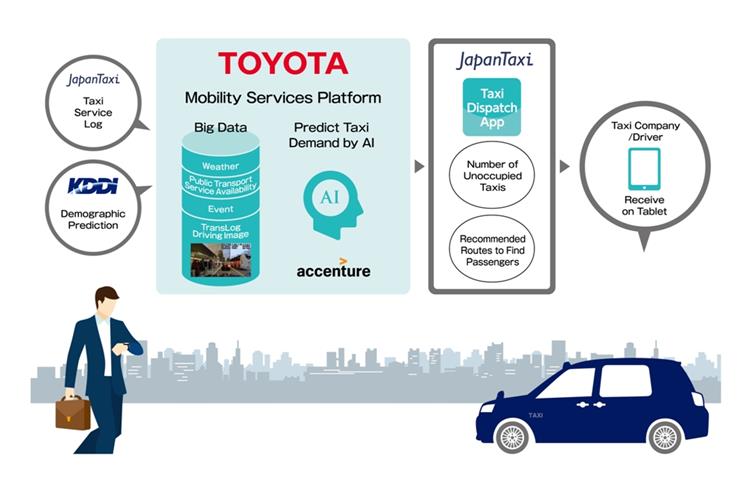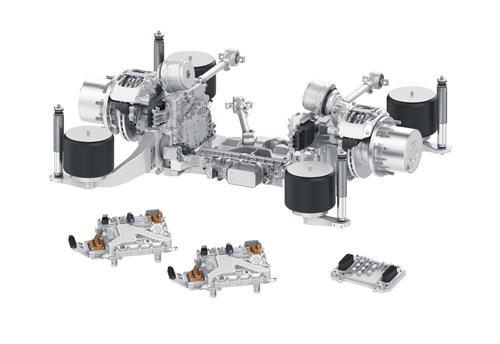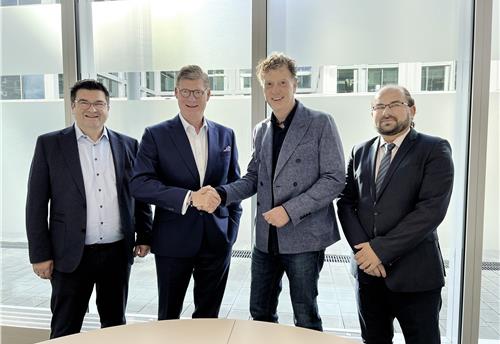Tokyo gets world’s first AI-based taxi dispatch support system
Toyota Motor Corporation along with JapanTaxi company with KDDI Corporation and Accenture to develop the AI based taxi dispatch system is being operated on a trial basis in Tokyo.
Toyota Motor Corporation and JapanTaxi Company have partnered with KDDI Corporation and Accenture working on developing a artificial intelligence (AI) based taxi dispatch support system that predicts demand for taxi services.
The system combines data from taxi service logs with predictions of demographics made by location-based big data from smartphones as well as event information. This untitled system has been deployed in Metropolitan Tokyo on a trial basis. The system uses artificial intelligence (AI) to predict the number of occupied taxis in Tokyo using 500-meter, mesh-based parameters every 30 minutes.
The companies collect taxi service log data and demographic predictions as well as other factors that affect taxi demand such as weather, public transport service availability, and events at large facilities, and apply learning models through an AI-based system to predict the size of the demand.
Incorporating Machine Learning and AR
In a test run in Tokyo, the system demonstrated a high accuracy rate of 94.1 percent. Since February 2018, the companies have been piloting the system with select taxis of Nihon Kotsu Company, an affiliate company of JapanTaxi, using tablet PCs equipped with the system. A map on the tablet shows not only the predicted number of occupied taxis but the latest number of unoccupied taxis around the area, which allows drivers to position their taxis based on the supply-demand balance. As a result, more taxis can serve areas with higher demand and insufficient supply to reduce waiting time for passengers while taxi occupancy rate is increased with optimal vehicle-dispatch. In addition, drivers can receive supporting information on the tablet that shows the routes where they are likely to find passengers, based on insights of drivers.
The companies believe that the system can contribute to transforming the taxi industry, enhancing convenience while also being used as a training tool for new taxi drivers. The partners plan to research the correlations between an analysis of driving image collected from Toyota's data-transmission TransLog driving recorder of which installation on taxis will be steadily expanded and taxi demand to leverage for the system, and further develop the system to help create a seamless mobility experience.
Role of each player in the system
Toyota will process and analyse the collected data on its Mobility Services Platform (MSPF), and provide it to JapanTaxi for taxi demand prediction data. JapanTaxi will develop the app while KDDI develops a demographic prediction technology for predicting people’s flow using KDDI’s location-based big data from smartphones. Accenture will work on the analytics algorithm for the artificial intelligence that powers the taxi demand prediction engine.
RELATED ARTICLES
Lamborghini unveils Urus SE ahead of Auto China 2024
Electric-only range of 60km helps reduce emissions by 80%.
ZF to display next-gen e-axle for low-floor city buses at Busworld Turkiye 2024
The AxTrax 2 LF is available with a continuous output of up to 360 kW and a peak torque of up to 37,300 Nm.
Daimler Buses and BMZ Poland to develop next-gen NMC4 electric bus batteries
The new battery generation NMC4 – succeeding the current NMC3 technology – will combine high energy density, resulting i...





 By Autocar Pro News Desk
By Autocar Pro News Desk
 13 Mar 2018
13 Mar 2018
 6040 Views
6040 Views









